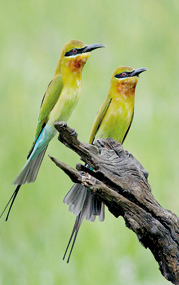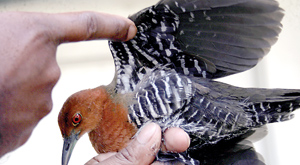News
Our feathered friends from across the seas are back
The birds are back and one of the earliest migratory visitors to Sri Lanka away from the harsh winters in the north is the Blue-Tailed Bee-Eater, point out Ornithologists.

One of the early migrants: The Blue-Tailed Bee-Eater. Pic by Rajiv Welikala
These birds leave their breeding grounds mainly in northern India and settle down here in various parts of the country, even in our home gardens. As its name implies the bird’s staple diet consists of flying insects such as bees dragonflies and butterflies. In the absence of trees their favourite perching platforms consists of television antennas and electric wires, making them a common sight even in a busy urban environment.
It has been recorded that some migratory birds arrive in Sri Lanka as early as August, but a majority make their journey from mid-September to October.
While some of these migrants fly into wetlands and forested areas, many of them opt for home gardens in urban areas. The Barn Swallow, Forest Wagtail, Brown Shrike, Brown Flycatcher, Asian Paradise Flycatcher (sudu redi hora) and Indian Pitta (Avichchiya) are a familiar sight in home gardens this time of the year.
The Field Ornithology Group of Sri Lanka (FOGSL) has this year too asked bird enthusiasts and other householders to keep an eye on who comes when and who leaves when, to help build up more data on migrant birds. In 2011 the group launched the programme, Migrant WATCH, to promote the observation of migrants and in turn their safety.

A Slaty-legged Crake rescued from the heart of Colombo a couple of years ago
Sometimes these migrants exhausted by their long-distance flight collide with window panes and get hurt. They can also become easy prey to domestic cats and dogs.
Bird experts say if one finds a migrant bird in distress put it in a cardboard with a few holes for ventilation and place the box in a quiet warm place. It if is too weak to fly it is recommended that small amounts of low concentrated glucose saline with Vitamin C be given. When the bird is able to fly again release it in a proper environment, the experts say.
Join these events
The Migrant WATCH will be launched on September 29 (Sunday) with a birding session at the Thalangama Tank in Battaramulla at 7 a.m. A lecture on ‘Waders and Other Migrant Birds’ will be delivered the day before, September 28 (Saturday) at 9.30 a.m. at the Zoology Department of the University of Colombo. The FOGSL especially welcomes those who are new to bird watching to take part in these events
Some of the other events organised include a wader workshop at the Bundala National Park (from October 16-20)) and a field visit to Mannar (December 13-16). For more information about these programmes contact FOGSL on 2501332 or 0718440144 or email fogsl@slt.lk
comments powered by Disqus
